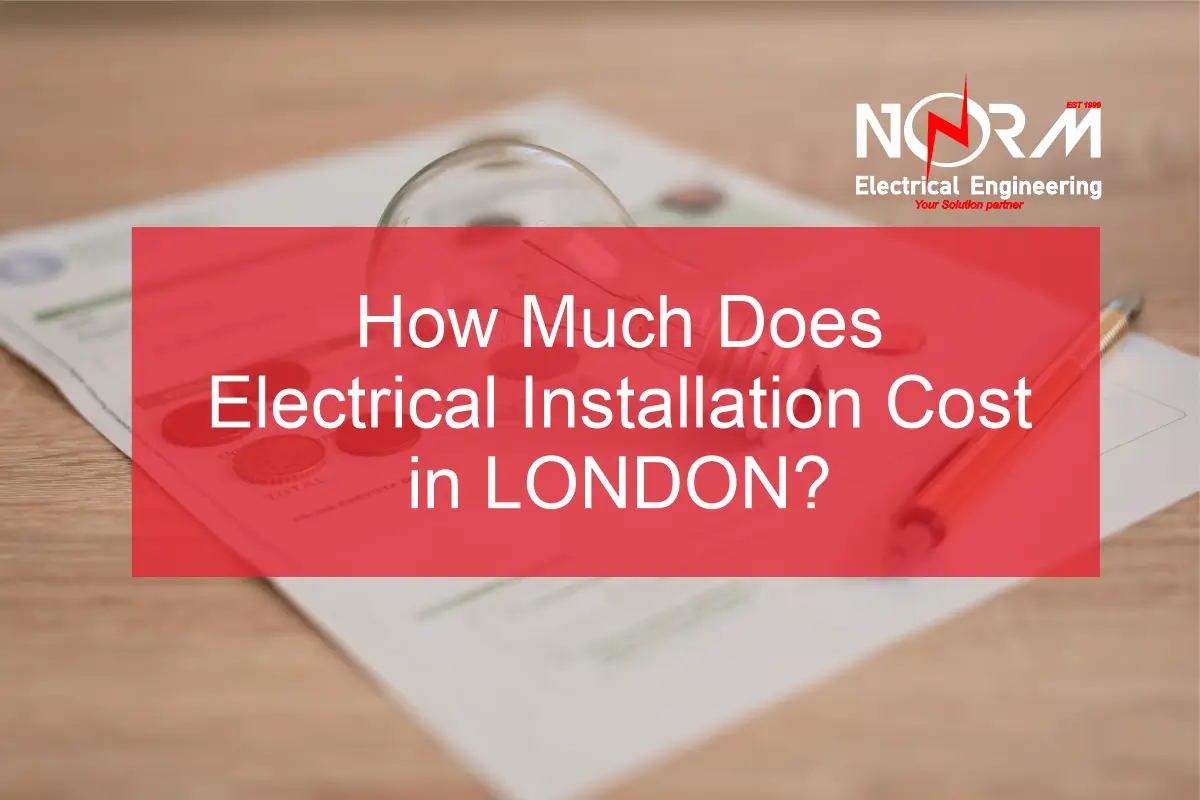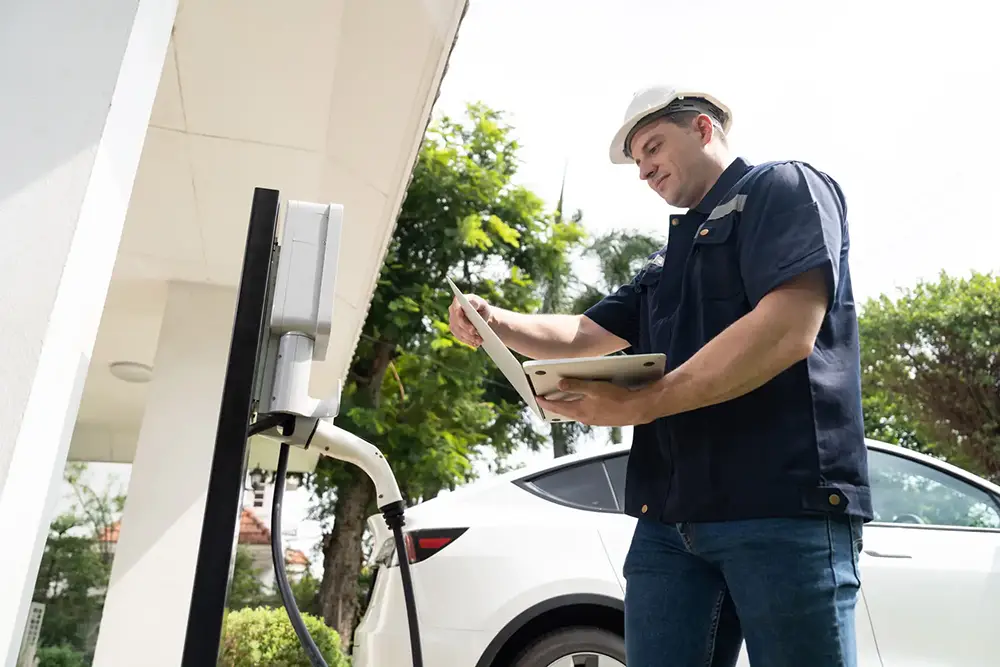How Much Does Electrical Installation Cost in London? – A Comprehensive Guide
Electrical installations are essential to the modern living experience, whether you’re constructing a new home, upgrading your existing property, or simply making necessary repairs. In London, electrical installation costs can vary depending on several factors including the complexity of the work, the type of electrical system required, and the materials involved. Understanding these factors can help you plan and budget for your electrical installation project.
In this comprehensive guide, we will explore the various aspects of electrical installation costs in London, offer practical tips to save money, and discuss the importance of choosing qualified, certified electricians for your installation needs. We will also provide links to government resources and trusted companies like Norm Electrical Engineering, where you can access further information on electrical installation and get a free estimate.
Table of Contents:
Introduction: Understanding Electrical Installation Costs
Factors That Affect Electrical Installation Costs in London
Cost of Different Types of Electrical Installations
The Importance of Certified Electricians
How to Find the Best Electrician in London
Costs for Electrical Installation in Residential Properties
Commercial Electrical Installation Costs
How to Reduce Electrical Installation Costs
Government Regulations and Requirements for Electrical Installations
How Norm Electrical Engineering Ensures Quality and Affordable Electrical Installations
Conclusion
1. Introduction: Understanding Electrical Installation Costs
Electrical installations are a vital part of both residential and commercial properties in London. Whether you need to replace an old fuse box, wire a new home, or install a more energy-efficient system, the costs of electrical installation can quickly add up. It’s essential to know what to expect when it comes to pricing, as well as the factors that affect the overall cost.
Electricians in London charge different rates depending on the complexity of the project, the number of devices and outlets involved, and whether the work is domestic or commercial. Additionally, labor costs in London can be higher compared to other regions, as it is one of the most expensive cities in the UK.
In this guide, we’ll break down the cost of electrical installations in London, outline the various services available, and provide tips for keeping your installation affordable. Whether you’re hiring an electrician for a simple task or a full-scale project, it’s important to understand the overall price range and the value you’re getting for your investment.
2. Factors That Affect Electrical Installation Costs in London
Electrical installation costs can fluctuate significantly depending on various factors. Let’s look at the key variables that impact the overall cost of an electrical installation project:
2.1 Type of Work
Basic Installations: Simple tasks like installing an additional power outlet, replacing light switches, or fitting new light fixtures tend to cost less. This work generally takes less time and doesn’t require much material, so it’s often more affordable.
Full System Installations: More complex projects, such as wiring an entire house or office, installing a new fuse box, or rewiring an entire property, require more time and expertise, and therefore come at a higher price.
Upgrades and Repairs: Upgrading your electrical system, such as replacing old wiring, fitting modern circuit breakers, or adding surge protection, will add to your costs. Repairs to existing systems, especially those that involve troubleshooting faults, will also vary in cost.
2.2 Size and Scope of the Project
The larger and more intricate the installation, the higher the cost. For example:
Residential installations will typically cost less than commercial or industrial installations, which often require more complex wiring and multiple circuits.
If you’re doing work in a multi-story building or if access to certain areas is difficult, you may incur higher labor charges.
2.3 Materials and Equipment
The type of materials and equipment required for the job plays a significant role in the cost. Higher-quality components, such as smart wiring or energy-efficient systems, may cost more upfront but could save you money in the long term due to increased energy efficiency.
2.4 Labor Costs
Labor costs in London are typically higher than in other regions of the UK, due to the cost of living and the higher demand for electrical services. The complexity of the installation will also determine how long it takes an electrician to complete the job.
2.5 Location of the Property
For installations in central London, there may be additional charges for the cost of travel, congestion charges, or parking. Properties located in more remote or difficult-to-access areas of London may incur higher charges.
3. Cost of Different Types of Electrical Installations
3.1 Domestic Electrical Installations
Domestic installations are typically more straightforward and less costly compared to commercial ones. Here’s a breakdown of the typical costs for domestic electrical work in London:
Fuse Box Installation or Upgrade: A fuse box installation or upgrade costs between £300 and £600 on average. This depends on the complexity of the system and whether you are upgrading an outdated model.
Rewiring a House: Rewiring a property can cost between £3,000 and £8,000, depending on the size of the home and the extent of the work. This typically includes the installation of new cables, sockets, and lighting systems.
Adding a Power Outlet or Switch: The cost of adding a new power outlet or switch ranges between £100 and £200 per installation.
Lighting Installations: Installing new lighting fixtures can cost between £100 and £300, depending on the type of light and how many fixtures are involved.
3.2 Commercial Electrical Installations
For commercial properties, the cost can vary widely due to the size and complexity of the installation. For example:
Electrical Wiring for Offices or Retail Spaces: This type of installation can cost between £1,500 and £10,000, depending on the size of the building and the number of circuits required.
Commercial Fuse Box Upgrades: Upgrading the electrical panel or fuse box in a commercial setting typically costs between £500 and £1,500.
3.3 Additional Services
EICR (Electrical Installation Condition Report): An EICR is typically required for rental properties and businesses. The cost of an EICR ranges between £100 and £300 for a domestic property and £300 to £800 for a commercial building.
Smart Home System Installations: Smart home installations, such as wiring for smart lighting, heating, or security systems, can range from £300 to £2,000, depending on the complexity of the system and the number of devices installed.
4. The Importance of Certified Electricians
It’s crucial to hire certified electricians when carrying out electrical installations. Working with a certified professional ensures that your installations meet the relevant UK safety standards and comply with regulations such as the Wiring Regulations (BS 7671) and Building Regulations Part P. Certified electricians are also insured, ensuring that you’re protected in case of accidents or damages during the installation process.
Hiring unlicensed or underqualified electricians can lead to substandard work, increased costs, and safety risks.
5. How to Find the Best Electrician in London
When hiring an electrician, it’s essential to ensure that they are fully qualified, licensed, and insured. Here are some ways to find the best electricians in London:
Check Credentials: Ensure that the electrician is accredited by professional bodies like NICEIC or NAPIT.
Get Multiple Quotes: Always get quotes from several electricians before deciding on the right one. This helps ensure that you’re getting a competitive price for the quality of work.
Read Reviews: Look for customer reviews or testimonials on the electrician’s website or third-party review sites to gauge their reputation and reliability.
Ask for References: Ask the electrician for references from past clients, so you can assess the quality of their work.
For more details on hiring electricians and ensuring that they meet UK standards, you can visit the official government website, gov.uk Electrical Safety Regulations.
6. Costs for Electrical Installation in Residential Properties
The overall cost for electrical installation in a residential property will depend on the size of the house, the age of the wiring, and the number of devices and outlets required. On average, homeowners in London can expect to pay:
Full House Rewiring: Between £3,000 and £8,000.
Additional Power Points: Between £100 and £200 per point.
New Lighting Installation: Between £100 and £300 per fitting.
7. Commercial Electrical Installation Costs
For commercial properties, the cost is significantly higher due to the complexity and scale of the work involved. Typical costs for commercial installations include:
Commercial Rewiring: Between £5,000 and £15,000 depending on the size of the premises.
EICR for Commercial Properties: Between £300 and £1,000.
8. How to Reduce Electrical Installation Costs
While electrical installations are an essential investment, there are ways to reduce costs:
Plan Ahead: Having a clear plan can prevent unnecessary changes and help avoid additional costs during the installation process.
Install in Phases: If you’re on a budget, you might consider breaking the work up into phases, completing essential work first and leaving non-essential items for later.
Choose a Trusted Provider: Work with experienced, trustworthy electricians who offer transparent pricing.
9. Government Regulations and Requirements for Electrical Installations
Electrical installations in the UK are subject to strict regulations, including:
The Electricity at Work Regulations 1989: Governs the safety of electrical systems in workplaces.
Part P of the Building Regulations: Requires certain electrical work in homes to be carried out by a qualified professional.
BS 7671 Wiring Regulations: Specifies the installation and maintenance of electrical wiring systems to ensure safety.
10. How Norm Electrical Engineering Ensures Quality and Affordable Electrical Installations
At Norm Electrical Engineering, we offer affordable and high-quality electrical installation services. We ensure that all our installations are compliant with UK safety regulations and that they meet the highest standards of quality. Whether you need rewiring, fuse box upgrades, smart home installations, or commercial electrical services, we provide transparent pricing and high-quality work.
Visit Norm Electrical Engineering or call 0208 245 8400 or 0772 430 8998 for a free, no-obligation quote.
11. Conclusion
Electrical installations are a vital part of maintaining a safe and functional property in London. The cost of electrical work can vary based on several factors, including the type of installation, the size of the property, and the complexity of the job. By choosing a certified electrician, planning your project effectively, and understanding the costs involved, you can ensure that your electrical installation is both safe and affordable.
Remember to check local government regulations and resources, like those found on gov.uk, for further guidance on electrical safety and installations in your property.









